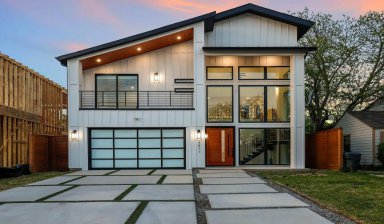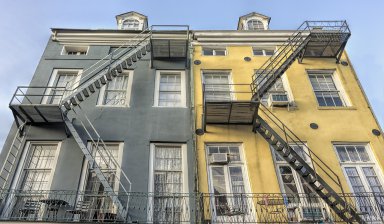The Redfin Rent vs. Buy Calculator uses information you provide to estimate the monthly and total costs of renting or buying your next home. In order to calculate an overall cost of renting and buying, the calculator considers different factors to estimate the financial impact of renting and buying: initial costs, recurring costs, opportunity costs and net proceeds.
Initial costs are the things you need to pay when you first move into a new place. When buying, these costs are going to be much higher than renting, so you should consider if you have the money to cover them before buying. For buyers, these costs include down payment and closing costs which are often around 24% of the total purchase price. When renting, this is typically just your security deposit which is usually equal to one months rent.
Recurring costs are the ongoing costs associated with living in the home you rent or buy. For buyers, this includes mortgage payment, property taxes, insurance, maintenance and utilities. For renters, this is typically just your monthly rental payment.
Opportunity costs aren’t direct out-of-pocket expenses, but they are important to consider when making a long term investment like buying a home. When you buy a home, you tie a sizable amount of your net worth into that home. If you didn’t buy that home, you could earn interest in the stock market or a savings account. This is your opportunity cost. In advanced options, you can update your expected return on investment to update the opportunity costs.
Net proceeds is money you get back when you sell your home or move out of your rental. For buyers, this is the principal you get back after paying off your mortgage minus any associated selling costs. For renters, this is typically just your security deposit which is returned to you after you move out.
Each of us has a unique lifestyle, financial situation, and set of long-term life goals that impacts our decision whether to rent or buy a house. To sort this all out for yourself, consider three main questions.
One of the most important questions to consider when deciding between renting versus buying a home is your timeline. For example, if you’ve just moved to a city, expect a job change soon, or don’t plan to stay in the community long, it may make more sense to rent. Selling a home costs money, and if you sell too soon after buying, it may not be worth it.
On the other hand, if you've found a community where you'd like to put down roots, buying may be the better option. Owning a home offers more stability and potentially more financial benefits for homebuyers who plan to live in an area for more than just a few years.
Buying and renting each have their own costs to consider - and this can make the difference between becoming a renter or a homeowner. To buy, you'll need enough money in the bank to afford a down payment and closing costs. How much that will be depends on your home loan, your lender, housing market, and more. Many buyers put down as little as 3%, though a larger down payment will usually save you money on interest and mortgage insurance.
There are also ongoing costs of owning a home—mortgage payments, maintenance, utilities, and different types of homeowners insurance. Learn more about what it costs to buy a house or use a mortgage calculator to get an idea of what you can afford.
If buying a home would take all your savings or stretch your monthly budget, it may make sense to keep renting for now. To rent, you typically just need to fill out a rental application, an application fee, a security deposit, and first and last month’s rent. Deciding to rent can also give you time to raise your credit score, potentially saving you money in mortgage interest and other loan-related costs.
Keep in mind that your monthly rent payment is likely to increase each time your lease is up for renewal. Depending on the housing market, you may end up paying more for rent than for a mortgage payment. A rent vs. buy calculator can help you evaluate which is best for your situation, but remember that it's only a rough estimate.
Renting vs. buying a house is also a lifestyle question. Homeownership is a long-term investment that can enable you to build wealth over time. That means treating your home as an investment and caring for it accordingly, with regular maintenance and repairs. Buying also comes with pride of ownership and the freedom to make decisions about style and upgrades that you typically don't have as a renter. In fact, in some markets buying a home with a yard, garage, or that third bedroom you've been wanting may be more affordable than trying to rent the equivalent property.
On the other hand, you may have good lifestyle reasons to continue renting rather than buying a home. Renting could be preferable if you'd rather not deal with the responsibility of home maintenance and the likelihood of paying for emergency repairs. Maybe a change is on the horizon, like a career transition or a child attending a different school, where renting a home makes more financial sense and aligns better with your long-term goals. Renting may also be a good choice if you have a busy lifestyle, move around a lot, or simply prefer more freedom and aren't ready for a big commitment.




 United States
United States Canada
Canada